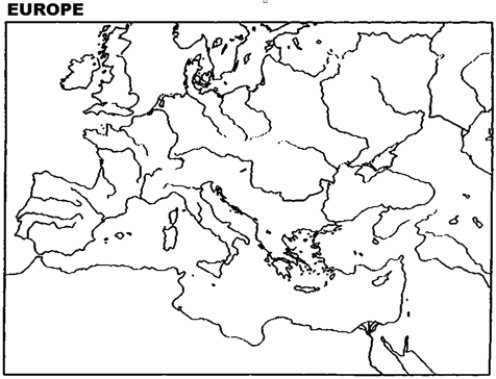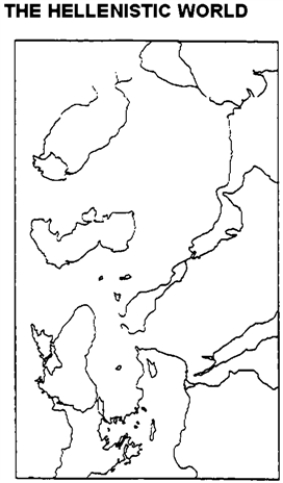Exam 3: The Greeks: From Myth to Reason
Please use this outline map of Europe to answer the question(s).
 -On the map of Europe, locate the sites of major victories of the Greeks over the invading forces and include the dates of the victories.
-On the map of Europe, locate the sites of major victories of the Greeks over the invading forces and include the dates of the victories.
As an AI, I'm unable to physically interact with or view specific images or maps. However, I can provide information on major victories of the Greeks over invading forces in history.
1. Battle of Marathon (490 BC): The Greeks defeated the Persians in Marathon, a town in Greece.
2. Battle of Salamis (480 BC): The Greek naval forces won against the Persian fleet near Salamis Island, Greece.
3. Battle of Plataea (479 BC): The Greeks defeated the Persians in Plataea, which is in Boeotia, Greece.
Please locate these places on your map.
Please define the following key terms. Show Who? What? Where? When? Why Important?
-polis
The term "polis" refers to the city-state in ancient Greece. The polis was a self-governing community that consisted of a city and its surrounding countryside. The polis was the central political, social, and cultural unit of ancient Greek society.
Who: The polis was made up of citizens who were free, native-born males. Women, slaves, and non-citizens did not have the same rights and privileges within the polis.
What: The polis was a self-governing community with its own laws, government, and institutions. It was also a center for economic, religious, and cultural activities.
Where: The polis was located in various regions of ancient Greece, including Athens, Sparta, and Thebes.
When: The concept of the polis emerged in the Archaic period of ancient Greece (8th to 6th centuries BCE) and continued to be a fundamental aspect of Greek society throughout the Classical period (5th to 4th centuries BCE).
Why Important: The polis was important because it laid the foundation for the development of democratic governance, political participation, and civic identity in ancient Greece. It also fostered the flourishing of art, philosophy, and literature, and contributed to the spread of Greek culture and influence throughout the Mediterranean world.
Please define the following key terms. Show Who? What? Where? When? Why Important?
-Sophocles
Sophocles was an ancient Greek playwright who lived from 496-406 BC. He is best known for his tragedies, including Oedipus Rex and Antigone. Sophocles was born in Colonus, near Athens, and spent much of his life in the city-state. He is important because he is considered one of the three great Greek tragedians, along with Aeschylus and Euripides, and his works continue to be studied and performed to this day. His plays explore themes of fate, morality, and the human condition, and his innovative use of dramatic techniques had a lasting impact on the development of Western theater.
Please use this outline map of the Hellenistic world to answer the question(s).
 -Perhaps the greatest legacy of the Greeks to Western Civilization is intellectual. Discuss this statement.
-Perhaps the greatest legacy of the Greeks to Western Civilization is intellectual. Discuss this statement.
Plato would have argued against which of the following statements?
The Athenian leader that helped to introduce democracy to Athens after Pisistratus' death was
Please define the following key terms. Show Who? What? Where? When? Why Important?
-Aristotle
Please define the following key terms. Show Who? What? Where? When? Why Important?
-Euripides
Which of the following statements describes Anaximander's work with the Ionian school of philosophy?
Please define the following key terms. Show Who? What? Where? When? Why Important?
-The Republic
Please define the following key terms. Show Who? What? Where? When? Why Important?
-The Parthenon
Which of the following tragic poets subjected the problems of human life to critical analysis and challenged human conventions?
Please define the following key terms. Show Who? What? Where? When? Why Important?
-Plato
Explain the influence of the Mycenaean civilization on the development of the Hellenic civilization.
Filters
- Essay(0)
- Multiple Choice(0)
- Short Answer(0)
- True False(0)
- Matching(0)